
NVIDIA ha lanciato in questi minuti una nuova video card basata su una gpu realizzata in accordo all'architettura a 28nm "Kepler", la GeForce GTX 660 Ti. La nuova arrivata si aggiunge alle giÓ commercializzate GeForce GTX 680, GeForce GTX 670 e alla dual-GPU GeForce GTX 690.
Nonostante sia caratterizzata da un prezzo suggerito dal produttore della gpu che, essendo pari a $299, risulta nettamente inferiore a quello delle soluzioni flag-ship, la GeForce GTX 660 Ti promette comunque prestazioni interessanti in ambito gaming. Il produttore, infatti, afferma che il nuovo prodotto Ŕ pi¨ veloce di circa il 41% (valore medio) rispetto alla GeForce GTX 560 Ti (architettura "Fermi").
In accordo a NVIDIA "la scheda grafica GeForce GTX 660 Ti combina potenza, prestazioni e convenienza". E inoltre "la tecnologia GPU Boost aumenta dinamicamente la velocitÓ di clock per incrementare le performance", mentre "le nuove modalitÓ di antialias (FXAA e TXAA, ndr) eliminano i bordi frastagliati senza sacrificare il frame rate". Infine, "NVIDIA Surround permette di giocare su tre monitor usando una sola scheda grafica".
La gpu della GeForce GTX 660 Ti include 1344 CUDA core; la frequenza di clock del core grafico ha un valore di base pari a 915MHz e pu˛ raggiungere la soglia dei 980MHz mediante la tecnologia GPU Boost. Il frame buffer della GeForce GTX 660 Ti Ŕ realizzato con l'ausilio di 2GB di RAM G-DDR5 che lavora a 6.0Gbps ed Ŕ connesso con la gpu attraverso un bus a 192-bit.
NVIDIA ha reso noto che i suoi principali partner, in termini di card maker, come ASL, ASUS, Colorful, ECS, EVGA, Gainward, Galaxy, Gigabyte, Innovision 3D, Jetway, Leadtek, MSI, Palit, Point of View, PNY, Sparkle e Zotac, hanno ampliato il proprio catalogo aggiungendo almeno una soluzione di classe GeForce GTX 660 Ti.

[Immagine ad alta risoluzione]
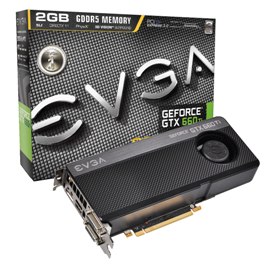
[Immagine ad alta risoluzione]
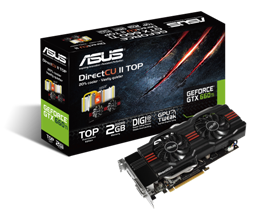
[Immagine ad alta risoluzione]
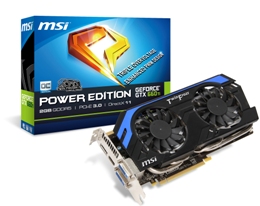
[Immagine ad alta risoluzione]
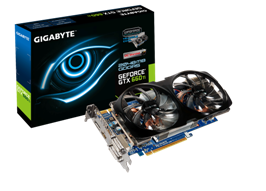
[Immagine ad alta risoluzione]
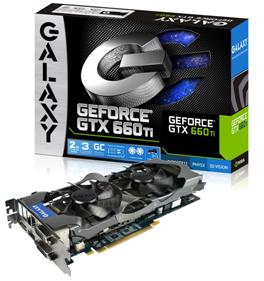
[Immagine ad alta risoluzione]
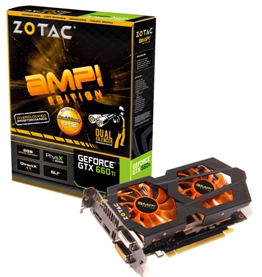
[Immagine ad alta risoluzione]
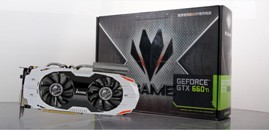
[Immagine ad alta risoluzione]

The NVIDIA Kepler architecture, which has revolutionized how PC games are played since its introduction in March, powers the new NVIDIA GeForce GTX 660 Ti GPU, which is available today starting at only $299.
Delivering truly game-changing performance for the most demanding PC games played at the gamer's preferred resolution of 1080p, the GTX 660 Ti is a dramatic upgrade for anyone playing on previous-generation graphics technology. The GTX 660 Ti is 41 percent faster on average than the GTX 560 Ti from 2011, and 58 percent faster on average than the GTX 470 from 2010.(1)
In addition to providing impressive performance, the GTX 660 Ti is filled with features, such as full support for DirectX 11 tessellation, TXAA, and PhysX technologies and the ability to drive a 3+1 display configuration from a single card.
Factor in the Kepler architecture's great efficiency and low thermal design power and the GTX 660 Ti assures gamers of having the most stable, quiet and power-efficient gaming experience possible in its price class. The GTX 660 Ti even keeps pace in performance with competing products that cost $50 more, while consuming up to 25 percent less power(2), a testament to the efficiency of the streaming multiprocessor built inside each Kepler chip.
These power savings come into sharp relief when two GTX 660 Ti cards are paired together in SLI mode, delivering performance that outpaces the competition by up to 21 percent.
For a limited time, gamers who purchase a GTX 660 Ti GPU from a participating retailer or e-tailer will receive a voucher for a free copy of Gearbox Software's Borderlands 2, which is launching next month. Borderlands 2 is on track to be one of this year's most popular PC titles and includes support for PhysX technology for a totally immersive gaming experience.
The GTX 660 Ti is built using NVIDIA's 28-nanometer Kepler architecture, as are the GTX 680, GTX 670 and dual-GPU GTX 690, all of which were introduced earlier this year.
Availability
The NVIDIA GeForce GTX 660 Ti GPU is available now from the world's leading add-in card suppliers, including ASL, ASUS, Colorful, ECS, EVGA, Gainward, Galaxy, Gigabyte, Innovision 3D, Jetway, Leadtek, MSI, Palit, Point of View, PNY, Sparkle and Zotac.
News Source: NVIDIA Press Release
Links
|